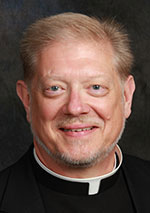That All May Be One / Fr. Rick Ginther
Observance of Lent a part of many denominations
 This year, I am experiencing a renewed realization: many Christians celebrate Ash Wednesday and Lent!
This year, I am experiencing a renewed realization: many Christians celebrate Ash Wednesday and Lent!
As a pastor in the Irvington area of Indianapolis, I am now a member of the Irvington Association of Ministers. Each Wednesday evening in Lent, one of our member churches hosts a Lenten soup supper and prayer service. The host pastor presides at the prayer service; another pastor preaches. The congregation is from the member churches.
Why should I be surprised that we are “doing Lent together”? I had experienced Lenten men’s breakfasts in Tell City. I had experienced other Christians, even ministers of other denominations, come to SS. Peter and Paul Cathedral on Ash Wednesday to receive ashes.
My renewed realization led me to examine resources of other Christian churches and their practices. (As I have said often in this column, dialogue is first about listening. In this case, it is about reading!)
Our Orthodox brothers and sisters share our long-standing observance of Lent and ashes. They speak of Lent as “The Great Fast,” and have specific foods from which they abstain for lengthy periods of Lent.
Episcopal Christians are fully observant as well. They receive ashes, and spend time in prayer, fasting and almsgiving. Their English ancestors even gave us the word “Lent,” an old English word meaning “spring,” the time of lengthening days.
Since 1979, United Methodists have had worship resources that include the distribution of ashes. The practice became part of the official worship resources in 1992 when its general conference adopted The United Methodist Book of Worship. Additionally, they enter into Lent as a “season of preparation, self-reflection and repentance,” seeking to “turn around” their lives toward God.
Presbyterians are divided regarding such observances. The Orthodox Presbyterian Church believes that the church is only to practice what the Bible actually establishes. In short, Lent lacks “scriptural warrant.”
On the other hand, the Presbyterian USA Church commences Lent with the distribution of ashes. The minister uses similar words to what we hear each year. Lent lasts for 40 days, and worshippers are encouraged to pray, fast and reflect on their sins and the suffering of Jesus Christ. A clear focus on their baptism and its meaning is also emphasized.
The Disciples of Christ do not require their member churches to follow the seasons of the liturgical calendar. However, congregations may observe them, including Ash Wednesday and Lent.
Lutherans, whether ELCA (Evangelical Lutheran Church of America) or LCMS (Luther Church, Missouri Synod), observe Ash Wednesday as the first day of Lent. The ancient practice of ashes on the forehead takes place. Lent is seen as a time for preparation of “the” major event in the life of Christ—his death and resurrection. Purple is worn. “Alleluia” is dropped. The season is penitential in character, but is also an intense time of preparation for those to be baptized at Easter.
Finally, a few evangelical churches have begun to observe Lent for its significant richness of spiritual exercises. However, the majority of evangelicals do not see a “scriptural warrant” for such practices. And other churches who find their authority based in “sola scriptura” (only from the Bible) do not have a day for ashes nor a season of Lent.
Ashes or not, Lent or not, all Christians share in the one hope rooted in the death and resurrection of Christ.
(Father Rick Ginther is director of the archdiocesan Office of Ecumenism. He is also pastor of Our Lady of Lourdes Parish in Indianapolis.) †
 This year, I am experiencing a renewed realization: many Christians celebrate Ash Wednesday and Lent!
This year, I am experiencing a renewed realization: many Christians celebrate Ash Wednesday and Lent!